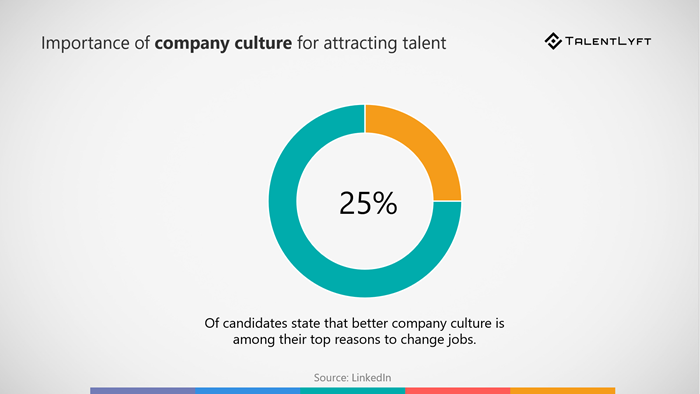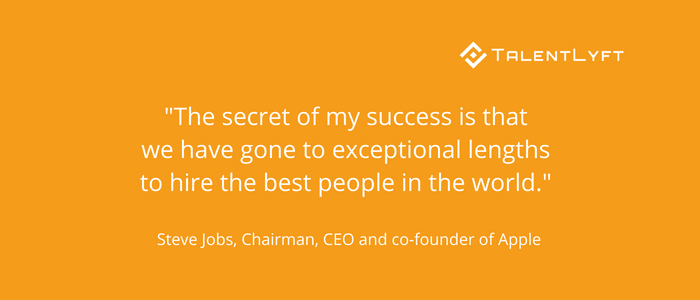
Great company culture is the critical factor for both attracting and retaining employees. Great company culture will make your company stand out and influence your team’s performance and improve their product.
Great company culture is the critical factor for both attracting and retaining employees. Great company culture will make your company stand out and influence your team’s performance and improve their product.
Many companies, both in-office and remote, are facing the struggle of finding their own voice and becoming recognizable: with so many competitors (sometimes dozens, sometimes thousands) in each and every field, how to ensure that your company stands out?
➡️ To learn how, download our free eBook: Most Productive Recruitment Marketing Strategies!
Another problem lies in the human resources: the endless cycle of attracting, recruiting, and retaining the best talent becomes increasingly harder - and it’s tempting to think high salary is the only method of keeping your workers engaged.
Our experience, however, tells us that there is an important factor which can unite the company and shield it from the crisis - this factor is company culture.
For many organizations, company culture isn’t a top priority: they focus on specific metrics as they can be monitored, measured, and analyzed with the utmost precision - customer/employee satisfaction, customer engagement, employee retention, and so on. These metrics are indeed crucial for every business, but it doesn’t mean that other aspects (like the one that we’re currently discussing) should be neglected.
Company culture is indeed a great tool for attracting new talent.

However, its benefits reach even further - it can also help to retain talent.
Here’s a typical scenario: your job offer was interesting enough for the True Professional and now this person is finally part of your team. Now, the next challenge begins: convincing them to stay and keeping your top performers motivated.
True Professionals have a hierarchy of work needs and this is how it’s organized, in ascending order:
Salary, although important, doesn’t reign supreme: talented workers are always guaranteed to have high pay.
Interesting projects are great to have, but work routine (and boredom caused by it) are far more frequent.
A sense of belonging which stems from the company culture.
So why is company culture so high on the list? Unlike salaries and interesting projects, company culture is more stable and far-reaching: in a time of crisis, when both employees and employers are in doubt, company culture can help the team persevere and stay united.
Let’s go back to how we can retain our company’s True Professionals. Every day, their work emails are bombarded by myriads of recruiters offering to switch jobs - and one day, True Professional might think: “Well, what’s keeping me in this company?” We can’t convince them to stay as this might prove to be too time-consuming; instead, we can prevent this from ever happening - and company culture can do just that.
Not only can company culture help retain employees, but it also improves employee happiness. Studies show that happy employees are more productive and more collaborative than unhappy employees.
A company culture that micromanages employees or promotes a culture of distrust can have serious consequences.
The struggle of establishing a company’s identity (and, by extension, its culture) is even more real for remote companies: without the luxury of face-to-face communication, remote workers may grow disconnected and dissatisfied – and their sudden change of heart will forever remain a mystery to the company’s managers. Although a plethora of recruitment trends can be used to make the company better, keeping the team intact is arguably more important.
For remote teams, crafting the company’s identity is even harder: lacking the most essential method of team building, face-to-face communication, they are puzzled as to how to keep their team members engaged - and creating company culture is equally hard. But they don’t despair! In many cases, remote companies incorporate the fact that they’re working remotely into their company culture.
Here at Soshace, we’ve done exactly that - we present remote workflow as an essential part of our company, our work ethic, and our work approach. Since remote work is a whole lifestyle in and of itself, our company culture promotes values like freedom and creativity. Another aspect of our culture is staying connected despite the vast distances - although we work from our home offices, we gather together for various outdoor activities (horse riding) and intellectual meet-ups (book club).
Curiously enough, great company culture can influence the team’s performance and improve their product. This goes in favor of the fact that 90% of professionals conduct research on a company's culture before accepting a role.
We can take Apple, one of the world's greatest companies, as an example. Apple’s way of hiring deserves a whole article in itself, but for now, we can focus on how they ingrained company culture in their hiring practices.
Although we like to praise Steve Jobs’ technological expertise, his approach to hiring was equally intelligent: Jobs was (almost notoriously) famous for not settling for, as he called them, “B and C players” - professionals who were okay and even good, but not the best of the best. Instead, he cultivated hiring “A-Players”; the quote from Walter Isaacson’s book. Steve Jobs sums it up perfectly:
I’ve learned over the years that, when you have really good people, you don’t have to baby them. By expecting them to do great things, you can get them to do great things. The original Mac team taught me that A-plus players like to work together, and they don’t like it if you tolerate B-grade work.

As it turned out, the “Hire A-Players” motto was much more than a cool slogan: throughout the company’s history, both HR executives and software engineers have agreed that only the best professionals are worthy to work for Apple.
This self-policing became a major part of Apple’s company culture and led to the creation of great products like Mac, iPod, and iPhone. Arguably, these products wouldn’t be possible without a company culture that fosters excellence.
It is not just a popular company culture myth - it really seems like all the best companies have the best company culture!
“What makes a great company?” is a question that doesn’t have a definitive answer. But one thing is for certain: company culture is a working tool that can make your company even better - try it yourself!
Denis Kryukov is an author at Soshace, an online hiring platform that connects IT professionals and companies.












